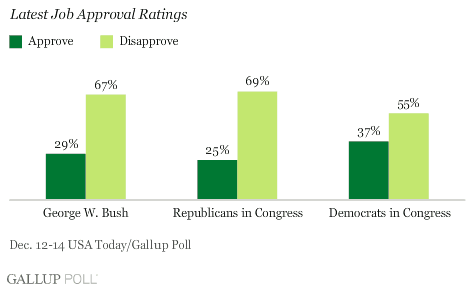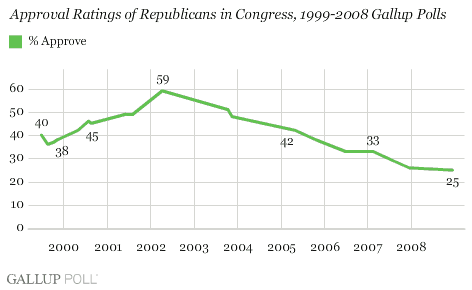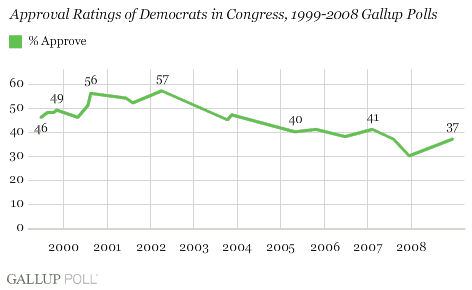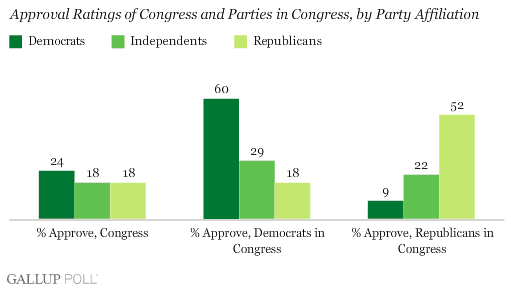PRINCETON, NJ -- Just one in four Americans approve of the job the Republicans in Congress are doing, an approval rating just below that given to President Bush. Americans are somewhat more charitable in their ratings of the Democrats in Congress.

The 25% approval rating for the Republicans in Congress establishes a new ���۴�ýPoll low, surpassing the 26% measured about this time last year. ���۴�ýfirst began asking about approval of the Congressional parties in 1999.

Congressional Democrats' approval rating is also low from an historical perspective, but does represent a significant improvement from 30% measured a year ago, their lowest rating to date.

Congress' overall approval rating -- asked without reference to either party and measured in a Dec. 4-7 ���۴�ýPoll -- is just 20%. Typically, both Congressional parties receive higher approval ratings than the institution overall. Asking about the individual parties appears to cause respondents to answer in more partisan terms. In general, ratings of Congress overall do not vary much by party affiliation, but the approval ratings of the parties in Congress show large differences when looking at party affiliation.

Bush Job Approval Slump Continues
Bush's 29% job approval rating in the Dec. 12-14 USA Today/���۴�ýpoll matches his average since Election Day. It remains slightly above the 25% rating he had in the final pre-election poll. However, it continues Bush's 27-month streak of approval ratings below 40% -- his last approval rating above that mark came in September 2006.
Bush has now matched Harry Truman's string of sub-40% approval ratings which began in late October 1950 and continued through the end of his presidency. Bush will surpass Truman's record if his approval ratings remain below 40% for his last month in office.
In his second term in office to date, Bush has averaged 36.5% approval. That is the same as Truman's second-term average. However, Richard Nixon has the distinction for the lowest term average of 34.4% from the beginning of his second term to his resignation amidst the Watergate scandal.
Bolstered by very high ratings following the Sept. 11 terrorist attacks, Bush averaged 62% job approval his first term in office, one of the better term averages for a president.
The overall unpopularity of the current government incumbents stands in contrast to the high ratings given to president-elect Barack Obama. The Dec. 12-14 poll finds 75% approving of the way he is handling his presidential transition. Certainly, the decisions made during a presidential transition are not likely to be as controversial as those made while governing, and all president-elects and new presidents enjoy a bit of a "honeymoon period" with positive ratings. Indeed, both Bush and Bill Clinton received very high scores for the way they handled their transitions.
Even so, Obama has been rated significantly more positively than both Bush (who averaged 63% approval) and Clinton (66%) during their transitions.
Survey Methods
Results are based on telephone interviews with 1,008 national adults, aged 18 and older, conducted Dec. 12-14, 2008. For results based on the total sample of national adults, one can say with 95% confidence that the maximum margin of sampling error is ±3 percentage points.
Interviews are conducted with respondents on land-line telephones (for respondents with a land-line telephone) and cellular phones (for respondents who are cell-phone only).
In addition to sampling error, question wording and practical difficulties in conducting surveys can introduce error or bias into the findings of public opinion polls.
